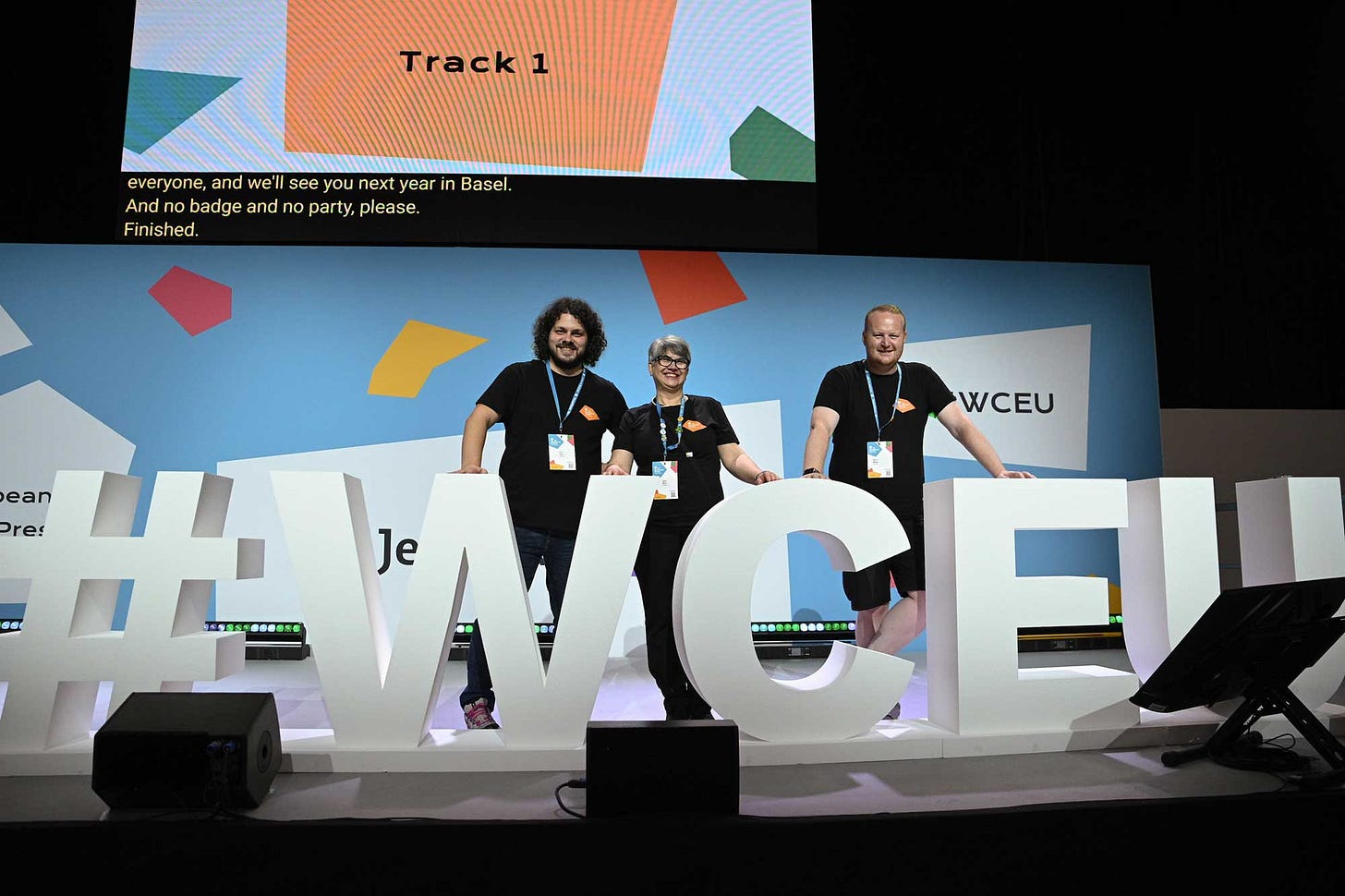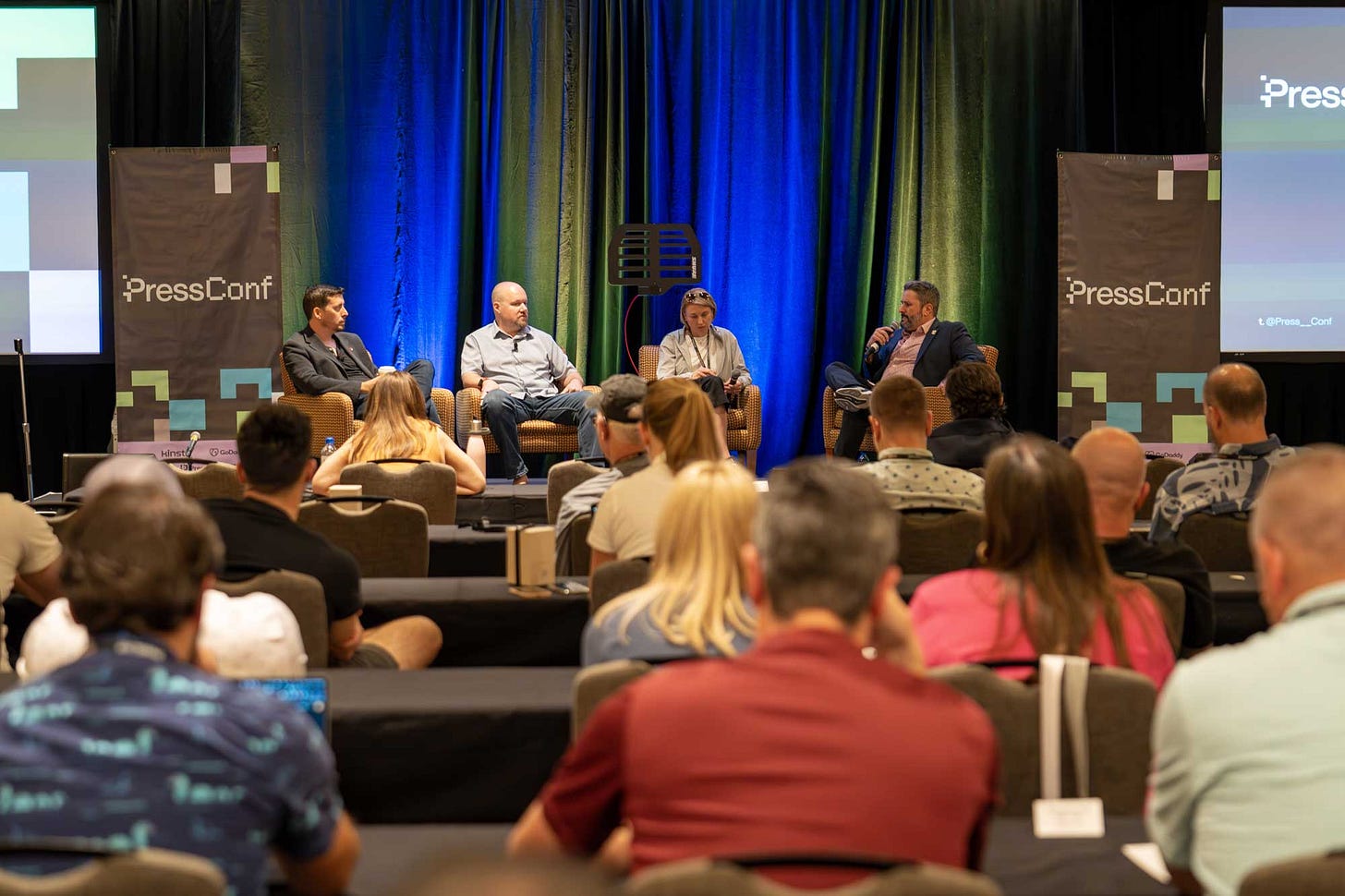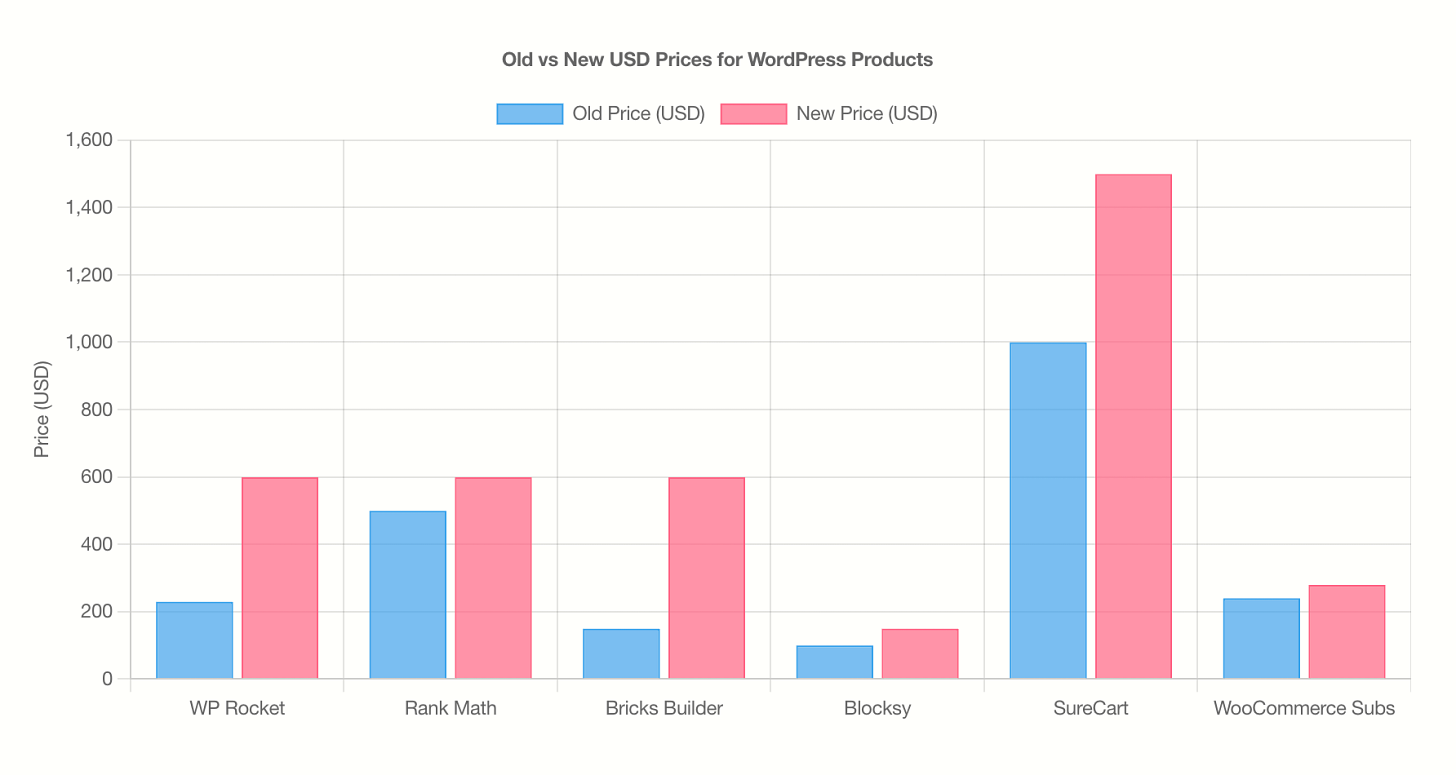Why we're still WordPress (despite everything) | WPMore - Issue 27
WordCamp Europe defied the odds, banned developers found their way back, women stepped into leadership across 25+ countries, and PressConf proved vulnerability beats posturing.
The WordPress community you thought was broken? It's stronger than we knew.
Hey there,
I'll be honest.
I almost didn't know how to start this newsletter. WPMore exists to bring you the stories that matter in WordPress, the ones that go beyond plugin updates and hosting deals to show you what's really happening in our community. And lately, what's been happening has been... a lot.
We've watched legal battles play out in public. We've seen longtime contributors banned without explanation. We've wondered if the community we've invested years of our lives in would survive intact. There were moments when writing about WordPress felt less like celebrating a platform and more like documenting a breakup.
But then something funny happened as I put together these stories. In Basel, I found organizers who refused to let controversy derail WordCamp Europe. In Bangladesh and beyond, I discovered women stepping into leadership roles for the first time. In Arizona, I saw business owners choosing vulnerability over posturing. And in one developer's painful account of being banned, I found a reminder that our community's strength isn't in its perfection—it's in our willingness to keep showing up for each other.
These aren't feel-good stories manufactured to make us forget the hard stuff. They're real accounts of real people navigating real problems. And somehow, that makes them more hopeful than any corporate PR statement ever could.
WordCamp Europe 2025: How Basel Became a Symbol of Community Strength
WordCamp Europe is happening June 5-7 in Basel, Switzerland, and honestly, the organizers deserve a medal just for keeping it together this year. Lead organizers Laura Sacco, Steve Mosby, and Uros Tasic managed a 90-person organizing team through one of the most turbulent periods in WordPress history.
The numbers tell part of the story: around 2,000 attendees are expected, which is better than anyone dared hope when planning began. Switzerland's reputation for high costs initially worried organizers, but they've worked hard to make the event accessible. Free tram travel comes with your Basel Card, you can bike in from France or Germany (literally across the border), and there are plenty of budget-friendly food options beyond the tourist traps.
What impressed me most was how the team handled the WP Engine-Automattic dispute. They held three town hall meetings—unrecorded, judgment-free spaces where organizers could voice concerns. "We're not here to pick sides," Uros explained. "We're here to organize a community event." When team members felt uncomfortable continuing, leaders made it clear they could step back without consequences.
The speaker lineup reflects deliberate choices around inclusion—something that took years of learning from past criticism. "This is the first year I can remember where we haven't had complaints about inclusion," Laura noted. They've also built in more networking breaks because, as Steve put it, "the most valuable part of WordCamp is the people."
For those still on the fence about attending: visa issues have been challenging (Switzerland isn't in the EU), but the team issued over 200 invitation letters to help. And the next location is already being planned with affordability and visa accessibility as top priorities.
Read the full interview with WordCamp Europe organisers here at The Repository
Edit: but actually Switzerland IS in the Schengen area, which is the same for ALL countries in it, same rules, same requirements, and not more difficult than with any other Schengen country (EU + Iceland, Liechtenstein, Norway, and Switzerland)
The local team received the endorsement of the Swiss Confederation, as shown on the WordCamp Europe website. The number of visa letters sent by the Attendees team is similar to that of previous years.
What It's Really Like to Be Banned from WordPress.org
Chris Reynolds discovered he was banned from WordPress.org on January 6th. No email, no notification, no explanation—just suddenly locked out of an account he'd held for 17 years. His story offers a rare inside look at what happened to dozens of community members during the height of the WP Engine controversy.
The ban appeared to stem from adding a clown face emoji to one of Matt Mullenweg's Slack posts. Chris explains the context: during COVID, he and his partner used that emoji to react to wild, unpredictable situations—not as a personal attack, but more like "things are getting out of hand." Without conversation or context, the reaction was apparently interpreted as hostile.
The practical consequences were serious. When Chris's Progress Bar plugin received a vulnerability disclosure through Patchstack's bug bounty program, he couldn't push the fix to WordPress.org where over 1,000 users had downloaded it. He could only update it on GitHub and Packagist, leaving repository users vulnerable. This highlighted a concerning precedent—earlier, Matt had taken control of WP Engine's Advanced Custom Fields plugin over a similar security issue.
The personal impact ran deeper. "I've never felt less like a valued member of the WordPress community than when my account was blocked with no justification," Chris wrote in his blog. It led him to DrupalCon Atlanta, where he found a surprisingly welcoming community facing similar challenges but handling them differently.
Chris was among 32 people whose bans were lifted last week—again, without communication or explanation. He's relieved but still processing the whiplash. His experience raises important questions about due process and communication in our community leadership.
Read the scope from The Repository: WordPress Leadership Reinstates 32 Banned WordPress.org Accounts, Launches Formal Review — Project leadership is reviewing WordPress.org and WordPress Slack bans following months of tension, with dozens of reinstatements already made and more under evaluation.
Read also — The real impact of a WordPress ban (progressplanner.com)
A different perspective on WordPress ban — Toxic Users: The Unforgiven and the Danger of Unbanning (halfelf.org)
Women in WordPress: A Global Movement Takes Root
Sometimes the best initiatives start with simple conversations. When Aditya Kane shared his sister's idea for an all-women WordPress meetup in Mumbai, it sparked something bigger. Pooja Derashri took that concept global, and the result was over 25 International Women's Day events across the WordPress community.
The logistics were challenging. Pooja personally reached out to 30-40 WordPress communities worldwide, many of which had never organized women-led events before. Some struggled to find female speakers or volunteers. But the persistence paid off, creating a powerful network of events from Ajmer to Nicaragua to Madrid.
The impact went beyond single-day celebrations. In Nicaragua, the event "was entirely led and organized by women, most of whom had never led a community event before." WP LATAM trained four new organizers who can now run events in their local communities. WP Bhopal held sessions in both Hindi and English for better accessibility, drawing everyone from students to entrepreneurs to a fifth-grade schoolgirl.
What struck me most was how these events created lasting change. As WP Pune organizers put it: "Our hope is that this event will inspire even more women to step into the spotlight, whether by organizing sessions, speaking at conferences, or leading teams in the tech industry."
This wasn't just about International Women's Day—it was about reshaping what leadership looks like in WordPress communities. When we create space for new voices to lead, we don't just run better events; we build stronger communities.
Read Puja Derashri’s full official recap here.
PressConf: Where Showing Up Still Matters
Sometimes the most important conversations happen when the cameras are off. PressConf wrapped up last weekend in Tempe, Arizona, and by all accounts, it was exactly what the WordPress business community needed—a chance to reconnect, be vulnerable, and remember why this all matters.
The numbers tell part of the story: 140 people, no recordings, and an atmosphere more like a retreat than a typical conference. Organizer Raquel Manriquez and her team created something special at the Tempe Mission Palms, the same venue that housed PressNomics for years.
The emotional openness surprised some attendees, especially international visitors not accustomed to American-style vulnerability in business settings. Miriam Schwab from Elementor delivered what many called the most powerful session, sharing deeply personal stories about balancing career, family, and the ongoing impact of war in Israel. Her talk ran 30 minutes over, but nobody left.
Read Rae Morey’s full PressConf here at The Repository
More PressConf recap blog —
→ Pressconf reflections (binatethoughts.com)
→ Business is personal (progressplanner.com)
Also Read: The WP Community Collective’s field report on PressConf
The WordPress Price Shock: How Soaring Costs Are Squeezing Millions of Website Owners
Your monthly WordPress expenses just doubled—and you're not alone. Across the globe, millions of website owners are facing a harsh new reality: the tools that power nearly half the internet are becoming increasingly expensive, and fast.
From WP Rocket's staggering 162% price jump to Bricks Builder's eye-watering 302% increase, the WordPress ecosystem is experiencing unprecedented price inflation that's leaving users scrambling for alternatives. But here's what makes this crisis particularly brutal—while Silicon Valley startups might shrug off these increases, small business owners in developing nations are getting hit with a devastating double punch: massive price hikes combined with weakening local currencies.
If you've been wondering why your favorite WordPress plugins suddenly cost more than your monthly rent, or if you're a developer watching clients abandon projects due to ballooning costs, this deep dive reveals exactly what's happening—and more importantly, what we can do about it. The numbers don't lie, and the impact is bigger than you think.
Read Gaurav Tiwari’s full deep dive on WordPress companies price hike
On other WordPress News
→ Post Status Acquires WP Speakers (poststatus.com) — Michelle Frechette’s long standing community driven project with 500+ WP speakers profiles found a new home.
→ Matt Mullenweg Settles Caregiver Lawsuits Days Before Trial (therepository.email) — Claims of wage theft, discrimination, retaliation, and defamation brought by two former caregivers against WordPress co-founder Matt Mullenweg have quietly settled after a nearly three-year legal battle.
→ WordPress Market Share, Statistics, and More (wordpress.com) — this article explores the platform’s market share in detail, as well as its versatility, reasons for success, and what keeps it ahead of the curve two decades after it launched.
→ WordPress Sites Cost Up to 44% Less Than Proprietary CMS Platforms, WP Engine Report Finds (therepository.email) — WP Engine’s new report puts a price tag on CMS decisions, claiming WordPress cuts website costs by up to 44%, as business leaders face longer buying cycles.
→ Mary Hubbard Moves to Rebuild Trust After WordPress.org Bans (therepository.email) — In a new Make WordPress post, Executive Director Mary Hubbard suggests moderation reforms, such as an appeals process, clearer Slack guidelines, and rotating roles, following months of community uncertainty over WordPress.org bans.
→ Announcing WordCamp Volunteer Badges on WordPress.org Profiles (make.wordpress.org) — Now, Wordcamp volunteers will get Badges for their contribution in WordPress community.
→ Second Plaintiff to Join Class Action Against Automattic, Mullenweg Over WP Engine Dispute (therepository.email) — Ryan Keller, who is suing over WP Engine’s temporary blocked access to WordPress.org, plans to expand his proposed class action and respond to Automattic’s push to dismiss.
From WordPress Community
→ Not everything needs AI. But WordPress needs AI-ready infrastructure (progressplanner.com) — Joost de Valk goes deep talking about why WordPress stand in a good place to build AI-ready infrastructure.
→ Freemius: Growing Beyond WordPress (thewpminute.com) — In this episode of the WP Minute+ Podcast, Matt welcomes Vova Feldman, the founder and CEO of Freemius, to discuss how the company is expanding beyond its roots in the WordPress ecosystem.
→ WordPress.org Plugin Submissions Surge 87% Amid Rise in AI Tools (therepository.email) — With plugin submissions up 87% and AI tools playing a bigger role in development, the WordPress Plugin Review Team is evolving its processes to keep pace — without compromising plugin or review quality.
→ New Social Icons for WordPress (make.wordpress.org) — WordPress.org now covers X, Bluesky, Mastodon, Threads, Facebook, Instagram, Linkedin, TikTok, YouTube, and Tumblr.
→ How to disable and lock Gutenberg blocks (kinsta.com) — Find different ways to block Gutenberg blocks when working on client site.
→ The 3 C’s of Becoming a WordPress Professional (thewpminute.com) — after years of working with WordPress businesses of all sizes, Matt found that real professionalism comes down to three simple but powerful principles
→ Top WordPress technologies to learn in 2025: Trends and expert opinions (gravitykit.com) — WordPress experts share their tech stacks, and thoghts on what skills you should learn now.
→ Seven Tasks to a Custom Block Theme: Anders Norén’s Weekend Workflow (gutenbergtimes.com) — Over a single weekend, Anders Norén built Pulitzer, a new block theme, from the ground up. In this post, you’ll learn about Anders’ process.
→ WP Perspectives Issue 24: 2025 the Year of the Page Builder (webtng.com) — Page builders are seeing a resurgence in 2025, checkout David McCan’s this post to learn more.
→ The unintended consequences of making SEO “for everyone” (joost.blog) — Joost talks about the unintended consequences of making Yoast.
Here's What I Keep Coming Back To
I keep thinking about something Uros from the WordCamp Europe team said: "We didn't have big hopes at the start, but now we believe again."
That sentence has stuck with me for days. Not because it's particularly profound, but because it's so damn honest. Most of us didn't have big hopes at the start of this year either. How could we? Every week brought new drama, new uncertainty, new reasons to wonder if WordPress was worth our continued investment.
But here we are, still building. Still organizing events. Still writing code. Still showing up for each other in Slack channels and GitHub issues and conference hallways. Not because everything is perfect—it's not—but because something about this community keeps pulling us back.
Maybe it's the memory of that first WordCamp where strangers became friends. Maybe it's the satisfaction of solving a tricky problem with custom post types. Maybe it's just the stubborn belief that the web should be something we can all contribute to, not just consume.
Whatever it is, it's stronger than the noise. Stronger than the controversies. Stronger than the disappointments.
Chris Reynolds, after months of being inexplicably banned, wrote: "I'm still here, so that's a start." That's not resignation—it's resolve. And it's everywhere in these stories.
We're still here. We're still building. We're still WordPress.
That's not nothing. That's everything.
Talk soon,
Nishat, WPMore
Follow → X.com | LinkedIn | BlueSky | Facebook
Join Our Community → Sub-Reddit | X Community
P.S. — If these stories resonated with you, forward this to someone who needs to hear them. And if you have a story about why you're still here, hit reply and tell us. We read every one.




